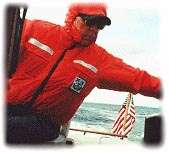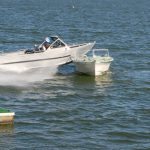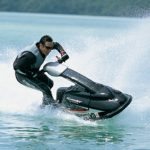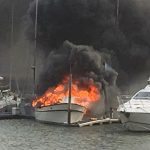At least where I live, winter is already beginning to rear its ugly head. Pleasure boats are coming out of the water for their winterizing ceremony and anti-freezing, and boat slips are beginning to look a bit lonely, as their former occupants head for the barn. With the slate-gray skies come the falling temperatures, and another boating season nears an end.
Those of you in other parts of the world might be interested to know that some of our upper Midwest states have the highest percentage of the total number of recreational boaters in the country. For example, according to the National Association of State Boating Law Administrators “Reference Guide to State Boating Laws” published in 1998, Minnesota has more registered boats than Florida, and Wisconsin has a higher number of boats registered than New York. Michigan has a higher number of registered recreational boats than does California. In fact, with nearly a million registered boats in 1998, Michigan leads all other states in that category. So I would imagine the water levels in those more northern states should drop considerably in the next month or so, as all those boats leave the water for storage sheds across the upper Midwest.
But not all recreational boaters head for the shed at the first sign of a temperature drop. Many of the boaters that make up the northern states boating population are fishermen or hunters using smaller boats. And fishermen or hunters in small boats in the fall and early winter months means more exposure to discomforts like frost-bite, and to risks of falls overboard into cold water and hypothermia.
So if you’re planning to venture out on a blustery day to get that last boat ride of the year, or to find that lunker bass or walleye or goose that’s been evading you since the start of the fishing or hunting season, consider carefully the clothing you’ll wear.
First of all, you need to think about the color of your clothing and your life jacket. There won’t be as many boaters out on the water at this time of the year to see you if you should fall in the drink, so you want to be as visible as possible to those that might be out there, or to someone on shore. Blaze orange is great. If I saw something blaze orange bobbing around in the water, it would catch my attention. On the other hand, if you’re wearing a hunter’s camouflage vest, it will probably appear to be just another grouping of choppy waves in the dark water.
Wear a warm, brightly colored hat, too. If you fall into choppy water, it may be the only part of you that will be easily seen. If you don’t have a bright hat, at least wear a warm hat. Most of your heat loss will be out of your head, so a hat or hood will be very important in body heat conservation. Extra minutes can mean the difference between yielding to hypothermia or being rescued.
Cotton clothing is great, as long as it’s dry. Cotton absorbs water like a sponge, and when it’s wet, it loses its ability to trap air and keep you warm. If you fall into the water wearing cotton clothing, you might as well be skinny-dipping. On the other hand, low absorption fabrics such as polyester, polypropylene, or even wool will work to keep you warm when you’re wet. Pound for pound, polypropylene is twice as warm as wool. It dries out quicker, and it doesn’t soak up much water. The only bad thing about synthetics that I can think of is that they melt when exposed to heat. So don’t use a blowtorch to light your cigar.
Another thing you can do to help stay warmer is to dress in layers. Not only does it enable you to vary your cover as the temperature and wind changes, but also air is trapped between the layers. When your body heat warms that trapped air, it provides good insulation.
In a week or so, my boat will be in the shop getting winterized, and then it’s off to the storage facility to hibernate until late April. I’m already starting to accumulate all the boating equipment catalogues and boating magazines I can get my hands on, so that I can be reminded of boating over this long, upper Midwest winter. I’ll be reasonably safe in my warm family room, reading my catalogues. But if your boating season won’t be over for a while, take extra precautions and make sure you dress as if your life depended on it.








